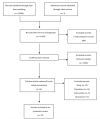The Effects of Nutritional Interventions on the Cognitive Development of Preschool-Age Children: A Systematic Review
- PMID: 35276891
- PMCID: PMC8839299
- DOI: 10.3390/nu14030532
The Effects of Nutritional Interventions on the Cognitive Development of Preschool-Age Children: A Systematic Review
Abstract
The developing human brain requires all essential nutrients to form and to maintain its structure. Infant and child cognitive development is dependent on adequate nutrition. Children who do not receive sufficient nutrition are at high risk of exhibiting impaired cognitive skills. This systematic review aimed to examine the effects of nutritional interventions on cognitive outcomes of preschool-age children. PubMed, PsycInfo, Academic Search Complete, and Cochrane Library electronic databases were searched to identify Randomized Controlled Trials (RCTs) published after the year 2000. Studies assessing the effects of food-based, single, and multiple micronutrient interventions on the cognition of nourished and undernourished children aged 2-6 years were deemed eligible. A total of 12 trials were identified. Eight out of the twelve studies found significant positive effects on cognitive outcomes. Iron and multiple-micronutrients supplementation yield improvements in the cognitive abilities of undernourished preschool-age children. Increased fish consumption was found to have a beneficial effect in the cognitive outcomes of nourished children. On the other hand, B-vitamin, iodized salt, and guava powder interventions failed to display significant results. Findings of this review highlight the importance of adequate nutrition during preschool years, and the crucial role sufficient nutrition plays in cognitive development.
Keywords: child development; cognition; nutrition; preschool.
Conflict of interest statement
The authors declare no conflict of interest.
References
-
- De Onis M.B.M. Quantifying the Health Impact at National and Local Levels. [(accessed on 31 August 2021)]. Available online: https://www.who.int/quantifying_ehimpacts/publications/MalnutritionEBD12....
-
- World Health Organization (WHO) Malnutrition Fact Sheets. [(accessed on 20 July 2021)]. Available online: https://www.who.int/news-room/fact-sheets/detail/malnutrition.
-
- World Health Organization UNICEF/WHO/The World Bank Group Joint Child Malnutrition Estimates: Levels and Trends in Child Malnutrition: Key Findings of the 2021 Edition. [(accessed on 31 July 2021)]. Available online: https://www.who.int/publications/i/item/9789240025257.
Publication types
MeSH terms
Substances
Grants and funding
LinkOut - more resources
Full Text Sources
Medical


